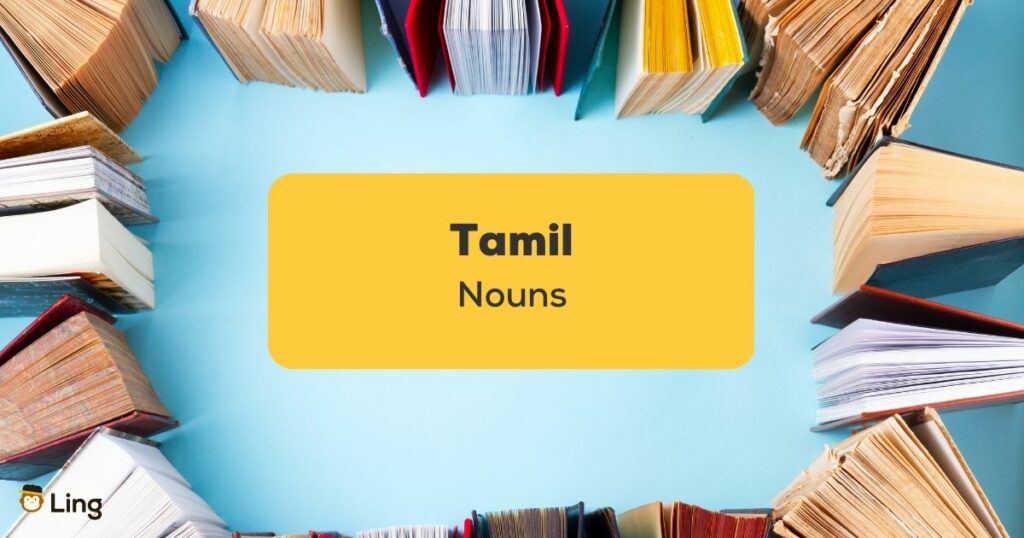Tamil is a rich and ancient Asian language that is known for its long and fascinating history. As a language lover myself, I do believe that its nouns are an integral part of its unique grammar and syntax. In this blog, we’ll explore the world of Tamil nouns or பெயர்ச்சொற்கள் (pronounced as Peyarccoṟkaḷ), from their various forms and functions to their usage in everyday conversation. So, whether you’re a beginner or an advanced learner, join us as we delve into the exciting world of Tamil nouns and discover all they have to offer. Let’s get started!
Nouns are words that represent people, places, things, or ideas. In Tamil, some examples of nouns include “புலி” or puli (tiger), “பிரிட்டிஷ்” or the name Pratish (side), and “சென்னை” or the place Chennai. Tamil nouns not only serve as the fundamental building blocks of the language but also provide context and clarity to communication, making them an essential component of Tamil communication and expression.
Ready to learn more about Tamil nouns? Let’s get started!
Tamil Nouns
Nouns in Tamil are categorized into two classes: the “high class” and the “lower class.” The “high class” includes rational beings like adult humans and deities, while the “lower class” comprises irrational beings and inanimate objects such as animals, birds, plants, and things.
In terms of grammar, Tamil nouns can be broadly classified into two categories: Proper nouns or சிறப்பு பெயர்ச்சொல் (pronounced as Ciṟappu peyarccol) and common nouns or பொது பெயர்ச்சொல் (pronounced as Potu peyarccol), each with its unique features and use in the language. However, nouns can also be divided into other forms like abstract, concrete, material, countable and uncountable, and so on. The key thing to remember here is that understanding the differences between these types of Tamil nouns is critical to improving one’s proficiency in the language.
Examples Of Tamil Nouns
- Animate or Inanimate Objects
- Hand – கை – Kai
- Wolf – ஓநாய் – Onay
- Rock – பாறை – Parai
- Chair – நாற்காலி – Narkali
- Pencil – எழுதுகோல் – Elutukol
- Places
- Bus stop – பேருந்து நிறுத்தம் – Peruntu niruttam
- School – பள்ளி – Palli
- Paris – பாரிஸ் – Paris
- Pondicherry – பாண்டிச்சேரி – Panticceri
- Concepts of Time
- Monday, Tuesday – திங்கள், செவ்வாய் – Tinkal, Cevvay
- January, February – ஜனவரி, பிப்ரவரி – Janavari, Pipravari
- Spring, Summer – வசந்தம், கோடை – Vacantam, Kotai
- Morning, Afternoon – காலை, மதியம் – Kalai, Matiyam
- Qualitative nouns
- Shapes – Circle, Triangle – வட்டம், முக்கோணம் – Vattam, Mukkanam
- Tastes – Sweet, Spicy – இனிப்பு, காரமான – Inippu, Karamana
- Quantity – Dozen, Bundle – டஜன், மூட்டை – Tajan, Muttai
So far, we have understood what Tamil nouns are but how do we use them in sentences? Let’s find out below!

Structure Of Tamil Nouns
Tamil nouns have inflection: This means a suffix is added to the stem words. For example, if nouns are made plural, the suffix “கல் kal” is used.
| English | Tamil | Pronunciation |
| Boy | பையன் | Paiyaṉ |
| Boys | பையன்கள் | Paiyaṉkaḷ |
| House | வீடு | Vitu |
| Houses | வீடுகள் | Vitukal |
| Dog | நாய் | Nay |
| Dogs | நாய்கள் | Naykal |
Tamil nouns have their meaning and rationality: These are high-class nouns and low-class nouns. Adults are high class. Birds and plants are lower class. Notice the differences between the first two words and the next two below.
| English | Tamil | Pronunciation |
| Adult | வயது வந்தோர் | Vayatu Vantor |
| God | இறைவன் | Iraivan |
| Bird | பறவை | Paravai |
| Plant | ஆலை | Alai |
They have gender: If you add rationality, gender, the fact that Tamil nouns often follow a neuter gender, and then singular and plural – you end up with five genders for Tamil nouns.
| English | Tamil | Pronunciation |
| Masculine – He who went | சென்றவன் | Ceṉṟavaṉ |
| Feminine – She who went | சென்றவள் | Ceṉṟavaḷ |
| Neuter – They who went | சென்றவர்கள் | Ceṉṟavarkaḷ |
| Singular – That which went | சென்றது | Ceṉṟatu |
| Plural – Those who went | சென்றவர்கள் | Ceṉṟavarkaḷ |
Tamil Sentences With Nouns
Mixing all the types and categories of nouns, let’s take a look at them in Tamil sentences.
| English Sentences | Tamil Sentences | Pronunciation |
| In Tamil Nadu, people wear bright and colorful clothes. | தமிழ்நாட்டில் மக்கள் பிரகாசமான மற்றும் வண்ணமயமான ஆடைகளை அணிவார்கள். | Tamiḻnāṭṭil makkaḷ pirakācamāṉa maṟṟum vaṇṇamayamāṉa āṭaikaḷai aṇivārkaḷ. |
| As children, give respect and courtesy to adults. | குழந்தைகளாக, பெரியவர்களுக்கு மரியாதை மற்றும் மரியாதை கொடுங்கள். | Kuḻantaikaḷāka, periyavarkaḷukku mariyātai maṟṟum mariyātai koṭuṅkaḷ. |
| We celebrate festivals such as Pongal, Diwali, and Deepavali. | பொங்கல், தீபாவளி, தீபாவளி போன்ற பண்டிகைகளைக் கொண்டாடுகிறோம். | Poṅkal, tīpāvaḷi, tīpāvaḷi pōṉṟa paṇṭikaikaḷaik koṇṭāṭukiṟōm. |
| They speak Tamil at home. | வீட்டில் தமிழ் பேசுவார்கள். | Vīṭṭil tamiḻ pēcuvārkaḷ. |
| She believes in gods and goddesses. | அவள் தெய்வங்கள் மற்றும் தெய்வங்களை நம்புகிறாள். | Avaḷ teyvaṅkaḷ maṟṟum teyvaṅkaḷai nampukiṟāḷ. |
| Their traditional food is delicious. | அவர்களின் பாரம்பரிய உணவு சுவையானது. | Avarkaḷiṉ pārampariya uṇavu cuvaiyāṉatu. |
| Iyer is very hospitable and always welcomes guests. | ஐயர் மிகவும் விருந்தோம்பல் மற்றும் எப்போதும் விருந்தினர்களை வரவேற்கிறார். | Aiyar mikavum viruntōmpal maṟṟum eppōtum viruntiṉarkaḷai varavēṟkiṟār. |
| Kumar provides the best education for their children. | குமார் அவர்களின் குழந்தைகளுக்கு சிறந்த கல்வியை வழங்குகிறார். | Kumār avarkaḷiṉ kuḻantaikaḷukku ciṟanta kalviyai vaḻaṅkukiṟār. |
| Tamil people are known for their strong work ethic and dedication. | தமிழ் மக்கள் தங்கள் வலுவான பணி நெறிமுறை மற்றும் அர்ப்பணிப்புக்காக அறியப்பட்டவர்கள். | Tamiḻ makkaḷ taṅkaḷ valuvāṉa paṇi neṟimuṟai maṟṟum arppaṇippukkāka aṟiyappaṭṭavarkaḷ. |
| They love their family and community. | அவர்கள் தங்கள் குடும்பத்தையும் சமூகத்தையும் நேசிக்கிறார்கள். | Avarkaḷ taṅkaḷ kuṭumpattaiyum camūkattaiyum nēcikkiṟārkaḷ. |
Learn Tamil With Ling

As we learned in this post, the Tamil language has a lot to offer to enrich your knowledge! If you ever find yourself drawn to learning more about this classical language, then nothing should stop you from mastering it. To enjoy more in Tamil, such as the pronunciation and verbs, or just for basic conversation, check out the Tamil blog here at Ling.
Follow us, or better still, download the Ling app through the Apple Store or Google Play Store. With every lesson being gamified and huge resources on phrases and vocabulary, you are in for a treat! Trust us- learning Tamil has never been easier. Try Ling today!



































































